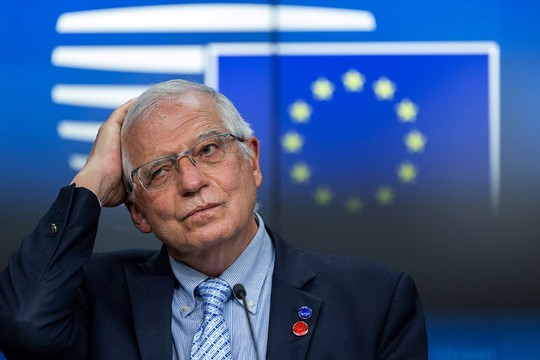In his fundamental article, Mr. Borrell (photo), a High Representative of the European Union for Foreign Affairs and Security Policy/Vice-President of the European Commission, demonstrates that he has realized: the collective West has lost its dominant role in the World. So, he is extremely concerned that “everyone think now that there are credible alternatives to the West”, and “if we (West) give up on a global collective capacity to set rules, everyone will do whatever they can or as they please.” And he started to panic.
He calls for gathering in the Global South any countries that will follow the West and making them allies. By and large, this is the tragic cry of a Western apparatchik who realized that his system of global control and domination was destroyed. And this is a very important recognition from Mr. Borrell. Here are some abstracts from his article:
“We live indeed in a more and more multipolar world, but multilateralism is in retreat. It is a paradox. Why? Because when the number of participants in a game increases, the natural response should be to strengthen the rules governing the game. However, we are facing the opposite trend: the rules governing the world are running out of steam. We must find ways to overcome this paradox.
This new multipolarity results from the combination of three dynamics. First, a wider distribution of wealth in the world, second, the willingness of States to assert themselves strategically and ideologically and third, the emergence of an increasingly transactional international system, based on bilateral deals rather than global rules.
But multipolarity is not just the result of distribution of wealth. The new multipolar world is characterised also by a growing demand for sovereignty and identity. Especially in the so-called Global South, although it is a very heterogeneous group of countries.
In Latin America, in Africa, in the Middle East and North Africa and, of course, in Asia almost everyone think now that there are credible alternatives to the West, not only economically, but also technologically, militarily and ideologically.
Rather, countries are seeking alternatives to the Western model on a case-by-case basis, as it is currently happening in different countries in Africa. These countries seem to be willing to work with whichever player that looks opportunistically able to replace the old ones. These new players offer the advantage of not asking who is in prison or where the money is really going. This suits many regimes.
This reality is reflected in the reactions to the Ukrainian war. Many Global South’s countries do not want that Ukraine dominate the world agenda. For example, they are afraid that funding for the green transition in the Global South could suffer due to the need to finance the reconstruction in Ukraine. For many countries far away from the EU, the Ukraine war looks like a simple border dispute between a large country and its smaller neighbour.
Beyond that, there is the question of values. Universalism is seen as a simple vestige of Western domination, forgetting that they are all signatories to the Universal Declaration of Human Rights. One argument often put forward is that the West itself does not always follow the rules it purports to defend.
As an alternative, they put forward a form of political culturalism, whereby every society would be entitled to have its own values. With this approach, a country’s sovereignty should take precedence over upholding of human rights and civil liberties.
This new multipolarity triggers a lack of international consensus on almost every issue. At a time where the need for global regulation increases, it fuels dissent. If we give up on a global collective capacity to set rules, everyone will do whatever they can or as they please.
We witness in particular a deadlock on security issues. We have a deadlock in the Security Council but also on a reform of the Security Council. No permanent members is willing to give up their veto right.
So, we have at the same time more and more influential players and more and more global challenges, but it is increasingly difficult to reach a consensus to face them. There is no longer a coalition of dominant powers (sic!) capable of imposing a Global Order. On the contrary, competing powers tend to neutralise each other. This situation is likely to persist until the balance of power between the dominant players has stabilised.
It could lead to the split of the world order into competing blocs in areas of security, economic integration and technology. The lack of consensus will then fracture the world and force third countries to align on one of the competing systems. It could be the case for example for the Internet where countries like Russia and China could impose their own specific standards and split the cyberworld. Such a fragmentation will of course create huge economic costs, and reduce incentives for cooperation on global issues like climate.
However, if we cannot find a single global alternative to the crisis of multilateralism, could we find partial ones? A more promising approach would probably be to pursue what is increasingly called “minilateralism”: agreements on different issues between like-minded states. However, to avoid the bloc-to-bloc confrontation I mentioned before, we must therefore imperatively adopt an approach that goes beyond the North or the West and attracts the support of key countries in the South. We need to expand the circle of like-minded countries to embrace others gradually and pragmatically.
The main risk today is the fragmentation of the world order into political, economic and technological blocs and we must prevent it.
What is it but a recognition that the West would like under the cover of verbiage to save the old system. Why? You know the answer…
read more in our Telegram-channel https://t.me/The_International_Affairs

 11:38 29.09.2023 •
11:38 29.09.2023 •























